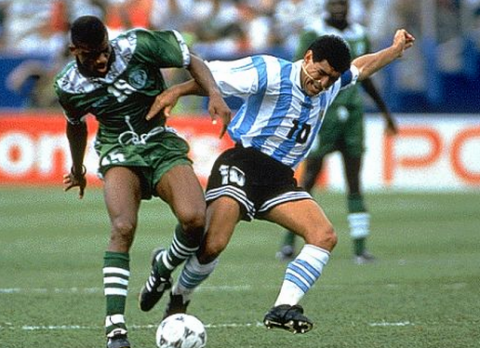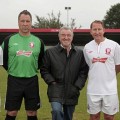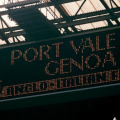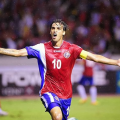Corruption, In-Fighting & Redemption: The Return Of Nigerian Football's Super Eagles
Nigeria's golden generation is long gone and after a decade of near obscurity and the most corrupt league in the world, the Super Eagles are back...

The country more known for its enticing spam emails declaring you are the recipient of one trillion dollars is back in the headlines after an extended hiatus for sporting prowess.
2013 marked the return of Nigeria to the summit of African football. The Super Eagles began the year with a bang, winning their first African Cup of Nations in January in 19 years. A stellar World Cup qualifying campaign followed as they reached Brazil 2014 unbeaten in their group but arguably the most significant achievement in the long-term was the record fourth World Cup win for the Under-17 national side.
Officials at the Nigerian Football Federation have been quick to pat themselves on the back but these short memories mask a tumultuous history and a domestic league that has been labeled the most corrupt in the world. Sit back, ignore your emails (sending your bank details to Prince Kumolotu can wait) and take a ride into the voodoo world of Nigerian football.
A relative youngster in the world of international football, the British colony took the game to its heart from its masters and after two decades of unofficial games against fellow colonies on the continent, they beat Sierra Leone 2-0 in 1949. The Nigeria Football Federation having formed just four years earlier and whilst still under British rule, they would tour the motherland playing against amateur teams. A Briton called Baron Mulford introduced the game in the early twentieth century. He took it upon himself to arrange a regular schedule of weekly match-ups pitting Nigerian youths against European youths in Lagos.
Despite the British influence Independence as a nation in 1960 was the catalyst to transform football from a game of leisure to the country’s most popular sport without exception since. Africa’s Challenge Cup, a predecessor of the British-formed Governor’s Cup, gave Nigeria a taste of competitive football that would fuel their first attempt to qualify for the World Cup. Despite failure to qualify for Chile 1962 and subsequent failures throughout to 1990, the seventies were a coming of age for the team as they laid the foundations for a golden age of Nigerian football.
Two third-place Africa Cup of Nations finishes in ’76 and ’78 were followed by their greatest achievement yet, winning the continent’s most important trophy on home soil and comfortably beating Algeria 3-0 in the final. The 1980s saw a pair of second-place finishes in the competition and with the team rarely out of contention at senior level in 1985 their youth contingent sounded a warning to the world by winning the first ever FIFA Under 17 World Championship in China.
More…
Drugs, Mafia And Murder: The Ten Most Corrupt Football Leagues Ever
The Under 20 team almost matched this achievement at the 1989 FIFA World Youth Championship but would lose a close final against Portugal. They will however forever be remembered as the victors at the quarter-final “Miracle at Damman”, clawing back from 4-0 down against the Soviet Union and winning on penalties. The momentum continued across all levels of Nigerian football with 1993 seeing a second FIFA Under 17 World Championship title followed by their first ever qualification for the World Cup.
If that was not enough the senior team would win their second Africa Cup of Nations in April 1994, the perfect preparation for their debut World Cup Finals appearance months later in the United States. Nigeria topped their group ahead of Argentina and would go on to be within two minutes of beating Italy in the Second Round, denied by a late Robert Baggio goal with the curly-haired assassin also striking the winner in extra-time. Just four years later at the World Cup in France, Nigeria again qualified for the knockout stages, with the press predicting an outside chance of glory, but they came apart in dramatic fashion in a comprehensive 4-1 defeat to Denmark.
The success of the 1990s was driven by a crop of players that went on to play for some of the world’s biggest club teams. In goal, the athletic Peter Rufai was supported by the eccentric but talented Inter Milan centre-back Taribo West, admittedly a player more memorable for his psychedelic hairstyles than his football. Ajax’s Sunday Oliseh provided the steel as an unflappable holding midfielder, going on to play for Juventus, and formed an enviable midfield with Ajax’s winger George Finidi and the flair of Frankfurt’s lauded Jay-Jay Okocha, the greatest player never to win an African Player of the Year award. If that was not enough the powerful Daniel Amokachi, later of Everton, and Rashidi Yekini regularly hit the back of the net, the latter still the country’s top scorer of all-time with 37 goals. Supported by Dutch coach Clemens Westerhoff, he would oversee a thrilling era for Nigerian football as an under 23 squad won the Gold medal at the 1996 Olympics in Atlanta.
As the 1990s came to an end Nigeria would suffer their own ‘Millennium Bug’. After failing to win the Africa Cup of Nations on their own turf in 2000, the 2002 tournament ended when a player revolt protested against the Nigeria Football Association. As the country’s most talented and senior players subsequently retired they also kissed goodbye to competing on the World’s biggest stage. Bowing out of the group stage at the World Cup in South Korea/Japan in 2002, the Super Eagles were descending. President Jonathan Goodluck went to the extent of banning the team from international competition for two years with FIFA further punishing the team, but this was later rescinded. By failing to qualify for the World Cup in Germany 2006 they would lose their mantle as Africa’s best team, finishing third five times in the Africa Cup of Nations between 2000 and 2010.
More…
The decade saw politics and infighting and corruption would grip Nigerian football like a cancer. A complete lack of trust between players and their football association created huge divides culminating in an embarrassing failure to qualify for the 2012 Africa Cup of Nations. At their lowest ebb the nation began to dissect their circumstance. A former Minister of Sports blamed the lack of collaboration between the National Sports Commission (NSC) and the Nigeria Football Federation (NFF). Many questioned where the US$1.25 million of FIFA funds for development were being spent each year and why so many officials were involved in handling money for travel, hotel expenses, facilities and all major resources.
The penny finally dropped in 2011 and with the formation of the National Football Federation to replace its former authority a new level of focus and organisation eventually followed. Regular and meaningful friendly matches were arranged to ensure the team competed against better nations and behind the scenes news of players not receiving promised bonuses or expenses began to dissipate. The technical team finally did the job they were paid to do and scoured local teams nationally to draw upon homegrown talent.
The result was their third Africa Cup of Nations title in 2013 ending a long absence of silverware and a record fourth World Cup title for the Under 17 national team. The youngsters will be eternally grateful to 17-year-old attacking midfielder and current Arsenal-target Kelechi Iheanacho, notching six goals and seven assists.
Ironically their recent success has come at the hands of a Nigerian leader, a former international player, Stephen Keshi. The majority of their history has seen foreign coaches take the helm, predominantly of English, Dutch, German and Eastern European nationality. He has managed to galvanise a squad that includes Chelsea’s John Obi Mikel, Liverpool’s Victor Moses, Lokomotiv Moscow’s goal-scoring forward Victor Obinna and a host of young stars plying their trade across Europe. The most recent squad has just a couple of players over 30 years old and is captained by Lille’s experience goalkeeper Vincent Enyeama the second most capped player ever behind Fenerbache’s centre-back veteran Joseph Yobo.
Current Sports Minister Bolaiji Abdullahi spoke recently on national television blaming two decades of failure on a lack of leadership. Remarkably he even stated that the football federation had in the past forgot to pack kits and that talent had not dried up, it was merely the leadership and management that disappeared. It was not just football that suffered but a weak performance at the London 2012 Olympics highlighted the issue at large. Funding is the current topic of importance as Abdullahi aims to work more closely with the Minister of Finance for Nigeria and create a separate budget for sports.
Ironically as the national teams are making huge strides, the domestic competition is as comical and corrupt as ever. In 2013 two teams were fighting for promotion to the top-flight Nigeria Premier League and were level on goal difference and points, winning 7-0 and 6-0 respectively at half time. The games were played concurrently and at the end of 90 minutes the scores were 61-0 and 79-0. Organised criminals and brown paper bags stuffed with money played a starring role to the almost amusement of the fans.
Since its official formation in 1972 there have been a host of winners, against the common pattern of a few heavyweight and regular champions, however Kano Pillars F.C. and the popular Enyimba are the most successful with six titles each. League standings in Nigeria are suspiciously competitive; astonishingly 12 of the 20 clubs are unbeaten at their home ground. Corruption will not be abolished overnight but on the positive side there are a handful of regular domestic players in the national squad and several more that have been given recent call-ups as back-ups to the European based stars.
With the World Cup in Brazil just months away the national team have been drawn against Argentina, Iran and Bosnia-Herzegovina and have a better chance than most to reach the knockout stages. Unfortunately even the most senior politicians in government have accepted corruption will never be eradicated in Nigeria but the signs are promising, if yet a little premature. Sporting confidence is notably high and if their world-beating youth team is nurtured and supported correctly the Super Eagles could soar once more.
Follow Terry on Twitter @telthetourist.
If you like it, Pass it on
 COMMENTS
COMMENTS
No comments yet, be the first!


 RELATED
RELATED




 SABOTAGE
SABOTAGE





